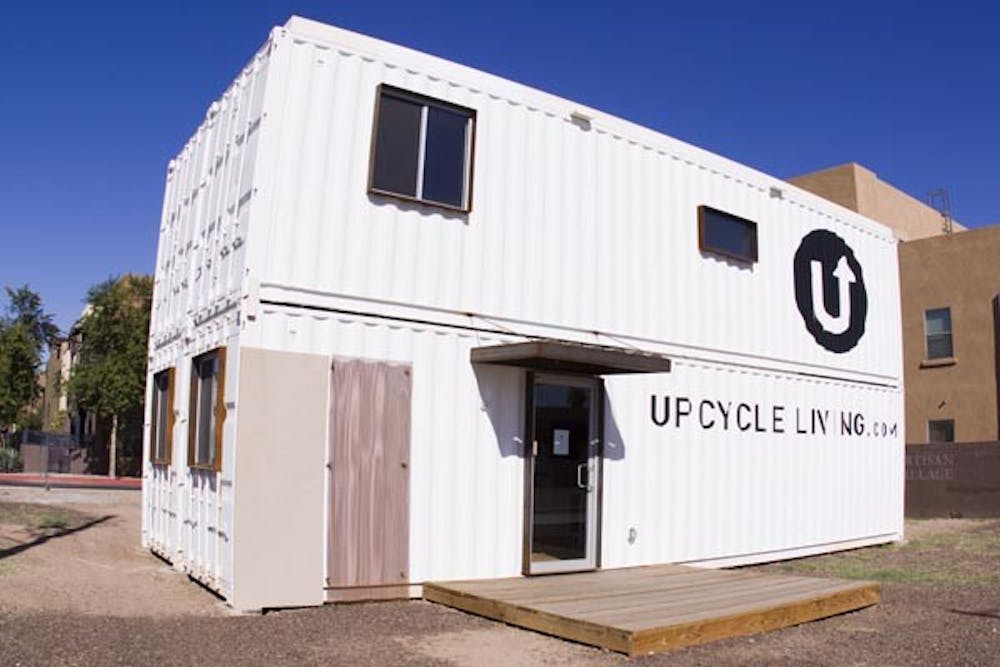While living in a box isn’t typically desirable, a Tempe company sees a future in the concept.
Using recycled, retrofitted shipping containers, Upcycle Living, a Tempe architectural firm, has transformed modular home construction into a sustainable lifestyle.
Partners Ashton Wolfswinkel and Jason Anderson created Upcycle Living two years ago with the goal of building affordable, sustainable housing for Arizonans. Using recycled shipping containers as the cornerstone of construction, the duo is working to improve the standard of living for those who cannot afford traditional housing.
The containers are incredibly durable, said Mike Duffy, project designer for Upcycle Living.
“They are built to withstand far more than any typical building since they are solid steel,” he said. “Just the sheer volume of these in production makes it easier and cheaper [than other supplies].”
Duffy, who graduated from ASU in 2005 with an architecture degree, became interested in alternative building methods in college.
He developed his work in college specifically using shipping containers in place of typical construction materials. His green thinking opened a door for him to find his partners Anderson and Wolfswinkel.
“It was a small-world, strange coincidence type of thing,” he said.
Four stacked storage containers sit atop a vacant dirt lot on Fifth and Roosevelt streets, demonstrating the vision and design behind Upcycle Living.
The 1,200-square-foot prototype located in downtown Phoenix was moved there a year ago, and has since been showcased to community members at events like the downtown Phoenix art walk First Friday.
The model home’s cost is estimated between $110,000 and $115,000, Duffy said. The price gives an estimate for clients who are interested in their own container homes. Each home is unique because of the different options, space and shipping factors that can influence prices, Anderson said.
Each model is designed to be green friendly, from the recycled floors to the high, insulated walls. Ceramic paint adorns the walls and helps reflect the sun, keeping heating costs down.
Each unit also has the option to be solar ready, Duffy said. The unit stands roughly eight-and-a-half feet tall.
Upcycle Living’s first major project was remodeling an existing 1950s ranch home in Phoenix. The clients wanted a high-design addition to their home and found the modified shipping containers to fit their budget. Three containers were used to create a master bedroom and bath, which were connected to the house by a single hallway.
“When we originally proposed it, the couple wanted to cover up the container and hide it,” Duffy said. “Once we got it on site though, they fell in love with it and left it a burnt orange color.”
Upcycle Living is also working now to integrate into rapid response disaster relief, beginning with a collaboration in Haiti, Anderson said.
“After the earthquake hit, we saw an opportunity to help with emergency housing,” Duffy said. “We knew there were a million people out of homes.”
Working with Valley photographer Sandey Tenuto, both partners traveled to Haiti to explore the community of Pwoje Espwa Sud, home to 600 orphans and vulnerable children.
The structural integrity is a key element. The fact that the permanent homes are metal and not able to be knocked down as easily as a hut can really impact lives, Duffy said.
“The ability to ship the containers internationally has also given the company a jump on other manufacturers who have to build their own frames,” Anderson said. “Those are really expensive to ship.”
The four containers that are now located in Haiti can easily be retrofitted into shelter, medical facilities or storage.
“Our huge goal is to create an improved standard of living for those who can’t afford traditional housing,” Anderson said.
With the transition of the housing market away from high rises and condominiums, affordable housing seems to be the way to go, Duffy said.
“A lot of mobile homes and affordable housing is built really bad, so we are trying to give something that is nice and somewhat sustainable,” he said. “Surprisingly there isn’t anything like this out there.”
Partnership with ASU’s School of Sustainability is also on the horizon for Upcycle Living. Collaborative projects with the University could help with funding and also raise awareness about the company.
“We are trying to build as many bridges as we can,” Duffy said.
Reach the reporter at amoswalt@asu.edu





